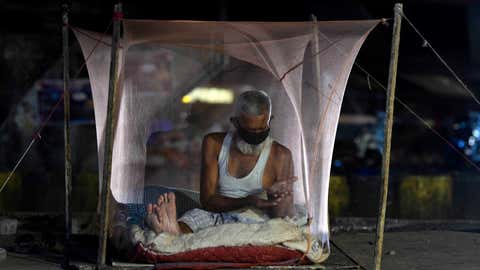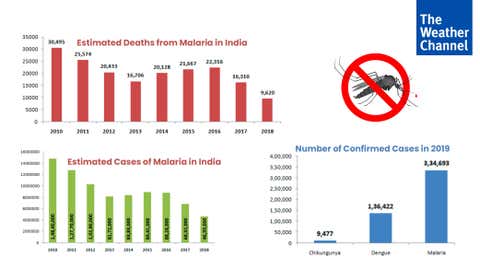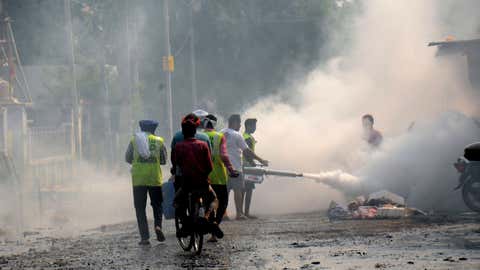
Representational image
(SL Shanth Kumar / BCCL, Mumbai)
A pandemic swept the entire world recently and left the health care system in many countries, including India, in tatters. Even while the entire world rightly focuses on fighting the COVID-19 pandemic, an age-old disease continues to claim thousands of lives every year in low- and mid-income countries, including India: Malaria. As the world celebrates World Malaria Day on April 25, humanity is a step closer to stamping out the prehistoric disease from the face of the Earth after battling for more than two thousand years, thanks to potential vaccines.
Even today, malaria kills more than four lakh people every year across the globe. A decade ago, India was reporting more than two crore malaria cases and more than 30 thousand deaths each year. Now, the death toll in India has dropped below 1o,000—2% of total malaria deaths across the globe. While the interventions to tackle mosquitoes remains of prime importance, researchers believe that an effective vaccine can be of immense help. The goal of ‘Malaria-free India’ remains distant, yet possible!
“We commend all countries that have reached the ambitious target of zero malaria”, said the United Nations Secretary-General António Guterres on the occasion of World Malaria Day. “Together, they are showing the world that a malaria-free future is possible”.
Oxford vaccine shows promise

Malaria continues to be a major concern in India, despite significant progress over the past few years (Data: WHO and NVBDCP)
(The Weather Channel India)
A team of researchers from the University of Oxford have been working on a novel malaria vaccine named R21 for several years now. In fact, the research is said to have contributed to the development of the Oxford-AstraZeneca COVID-19 vaccine as well. Now, in a recently published pre-print of the study results, the team announced that the vaccine demonstrated high-level efficacy of 77 per cent in its early human trials.
In Burkina Faso, a country with a substantial malaria burden in West Africa, researchers conducted the phase 2, randomised, controlled, double-blind trial on 450 participants, aged 5-17 months at the two clinical research centres. The participants were split into three groups, with the first two groups receiving a low and a high dose of the vaccine, where Matrix-M was the adjuvant used. The third (control) group received a rabies vaccine. Doses were administered from early May 2019 to early August 2019, largely before the peak malaria season.
The researchers report a vaccine efficacy of 77 per cent in the higher-dose and 71 per cent in the lower dose group over 12 months of follow-up, with no serious adverse events related to the vaccine noted. Following these results, the Phase 2b trial was extended with a booster vaccination administered prior to the next malaria season one year later.
“These new results support our high expectations for the potential of this vaccine, which we believe is the first to reach the World Health Organisation’s (WHO) goal of a vaccine for malaria with at least 75 per cent efficacy,” said the team including Adrian Hill, Professor of Vaccinology at the University of Oxford.
“With the commitment by our commercial partner, the Serum Institute of India, to manufacture at least 200 million doses annually in the coming years, the vaccine has the potential to have a major public health impact if a license is achieved,” Hill said. The researchers, in collaboration with Serum Institute of India Private Ltd, and Novavax Inc, have now started recruitment for a Phase 3 trial to assess large-scale safety and efficacy in 4,800 children, aged 5-36 months, across four African countries.
WHO aims to make 25 more countries malaria-free by 2025

File photo of anti-mosquito fogging at Rajendra Nagar, Patna.
(KM Sharma/BCCL, Patna)
On World Malaria Day, the WHO launched a new initiative this week aiming to halt transmission of malaria in 25 more countries by 2025. Thailand, South Africa and Saudi Arabia are among the countries which the WHO aims to make malaria-free. The 25 countries will receive specialised support and technical guidance to help eradicate the disease.
Countries in Southeast Asia’s Greater Mekong region have already made great strides: the number of cases in the region comprising Cambodia, China (Yunnan province), Laos, Myanmar, Thailand and Vietnam fell by 97 per cent between 2000 and 2020, the WHO said in a statement.
But the coronavirus crisis has emerged as a serious challenge to malaria responses worldwide. “More than one year into the pandemic, substantial disruptions to health services persist across the globe,” the WHO said.
In many countries, lockdowns and restrictions on the movement of people and goods led to delays in the delivery of insecticide-treated mosquito nets or indoor insecticide spraying campaigns. Malaria diagnosis and treatment services were also interrupted. Globally, 39 countries and territories have been recognised as malaria-free by the WHO. Eleven countries have been certified malaria-free in the last 20 years.
Of the 87 countries with malaria, 46 reported fewer than 10,000 cases of the disease in 2019. There were an estimated 22.9 crore cases of malaria worldwide, while the estimated number of malaria deaths stood at 409,000 in 2019, according to the WHO.
The results of the Oxford research are yet to be peer-reviewed and can be accessed in the pre-print archive of the journal The Lancet here.
(With inputs from IANS)
**
For weather, air pollution, science, and COVID-19 updates on the go, download The Weather Channel App (on Android and iOS store). It’s free!




